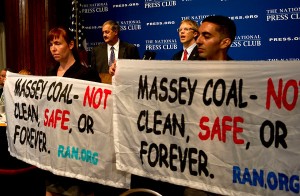RAN activists just disrupted Massey CEO Don Blankenship’s talk at the National Press Club sending him a strong message:“Your coal is not Clean, Safe or Forever.” They were eventually escorted out by security. Pics. Video.
Washington, D.C. (7/22/10)— Today activists with the Rainforest Action Network (RAN) attended Massey Energy CEO Don Blankenship’s National Press Club speaking event. RAN was there to call attention to Massey’s repeated mine safety violations, including the April 5 Upper Big Branch mine explosion in which 29 miners tragically died, as well as the company’s lead role in mountaintop removal coal mining (MTR).
Blankenship has gained quite a reputation for his company’s mine safety violations as well as his indifference to environmental protection and climate change.
“Massey is the BP of the coal industry: reckless, arrogant and an obstacle to the clean energy future that the president and the country is calling for,” said Amanda Starbuck of the Rainforest Action Network. “The bottom line is that clean, safe and forever are three words that Massey Energy can never credibly say.”
Massey mines more MTR coal than any other company in Appalachia, mining 20% of all MTR coal in 2009. Blankenship spoke at the National Press Club on the topic of increasing the surface mining of coal. It seems Blankenship is trying to protect his company’s future at a time when the tide is clearly turning away from the controversial mountaintop removal coal mining practice.
In the last year, leading scientists, congressional representatives, Appalachians, environmentalists and even the late coal state Senator Robert Byrd have all called into question the coal mining practice. In addition, in April the EPA came out with strict new guidelines on MTR, which make it harder for companies like Massey to receive mining permits. Currently, mountaintop removal coal makes up 7 percent of the nation’s total coal use but has an outsized impact on Appalachia’s environmental and public health.
Massey Energy’s mountaintop removal mine sites use some of the most environmentally devastating types of mining to blow up Appalachian mountains and bury streams in toxic mine waste in order to reach coal seams that lie deep beneath the mountains’ surface. Since 1992, nearly 2,000 miles of Appalachian streams have been filled at a rate of 120 miles per year with toxic surface mining waste.
The estimated scale of deforestation from existing Appalachian surface mining operations is equivalent in size to the state of Delaware. A paper released in January by a dozen leading scientists in the journal Science concluded that mountaintop coal mining is so destructive that the government should stop giving out new permits for the practice all together.
“The science is so overwhelming that the only conclusion that one can reach is that mountaintop mining needs to be stopped,” said Margaret Palmer, a professor at the University of Maryland Center for Environmental Sciences and the study’s lead author, when the paper was released.
Coal mining costs Appalachians five times more in early deaths than the industry provides to the region in jobs, taxes and other economic benefits, according to a groundbreaking new study released this month by a West Virginia University researcher. Several peer-reviewed studies have also found that residents of coal-producing counties are more likely to suffer from chronic heart, lung and kidney diseases and more likely to be hospitalized for certain health problems, like lung cancer, that are connected to coal pollution.
Massey Energy has a long history of environmental and social irresponsibility. It has been cited for repeated mine safety violations in recent years, racking up hundreds of penalties at the infamous Upper Big Branch mine alone as well as playing a role in one of the largest slurry spills ever to take place in the United States, the 2000 Martin County sludge spill in Kentucky.
For more information about coal and public health, visit: http://www.publichealthreports.org/
For more information about mountaintop removal and Rainforest Action Network, visit: http://ran.org/content/mountaintop-removal-american-tragedy
